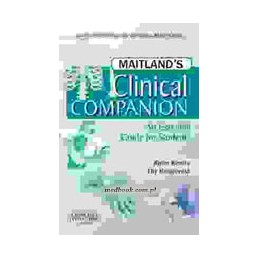- Obniżka


 Dostawa
Dostawa
Wybierz Paczkomat Inpost, Orlen Paczkę, DHL, DPD, Pocztę, email (dla ebooków). Kliknij po więcej
 Płatność
Płatność
Zapłać szybkim przelewem, kartą płatniczą lub za pobraniem. Kliknij po więcej szczegółów
 Zwroty
Zwroty
Jeżeli jesteś konsumentem możesz zwrócić towar w ciągu 14 dni*. Kliknij po więcej szczegółów
The principles of the Maitland Concept of Manipulative Physiotherapy are applied to each body region so as to guide the student through to the appropriate selection, application and progression of mobilisation and manipulation techniques within the context of contemporary physiotherapeutic rehabilitation.
A vital companion to the classic texts - Vertebral and Peripheral Manipulation - which promotes a patient-centred approach to neuromusculoskeletal disorders.
Opis
